Two weekends ago, I took our youth leaders to YSPalooza in Philadelphia and we really liked it. So for those of you in the Dallas, TX area (and for those of thinking of 2012 already), I wanted to suggest you go too. This is ideal for youth min teams who are in somewhat normal churches. What I mean is that I have a fantastic volunteer leader team, a limited budget, and in a traditional/blended church model with a facility that does not draw in outside students (although we have a cool youth room). So, attending the National Youth Workers Conference in Nashville as a team is not going to happen for us – YSPalooza is a terrific solution.
 The Challenges For Us
The Challenges For Us
Even with the cost being affordable ($100 bucks now, but early bird group was $79), to bring 10 people and find hotels still takes a bite out of the budget.
Without exception, all of our volunteers work real jobs for a living. So the 1pm Friday start time was a challenge.
Our Solutions
We started talking about this possibility back in the Fall when it was announced (thanks YS for the heads up – we needed it). Even so, for some it still came down to a last minute decision.
Though our leaders are extremely busy (which isn’t conducive to the most time and energy draining ministry of the church), our leaders are committed to this and they sacrificed the time for it.
We are taking a bite out of the budget that is reduced each year because we believe in leader training. (And if the trustees have a problem with that, they can host the next Jr. High Lock-In at their house :) By the way, an All Night Lock-In Tour at trustee houses would be a great idea).
For the leaders whose jobs made it impossible for them to miss Friday, they left at 5am Saturday morning to meet up with us for the first Saturday am session. (I told you, they were dedicated, well except for one because well you know, there’s always one :)
What I Liked:
For years, I have been a fan of YS but with the owner transitions going on the past couple years, I admit, there was a hesitation on having too high of expectations. So the first thing I want to say about the YSPalooza was that it seemed to be very YS.
The second thing I liked was the same schedule, same seminars, and same workshops for everyone. No options, no extra stuff, no one running around looking for room 303 and wondering which seminar to attend. This format for this type of event significantly helped our conversations.
I liked that it was pretty stripped down in terms of set and signage. The bands played through the house speakers (though it was a bit loud and I found the color lights distracting but I’m not used to worshipping that way but again, it looked like it was all part of the church).
Duffy Robbins and Jim Burns still got it.
I really liked the schedule and the way it all flowed. Liked that it all ended before dinner on Saturday too. I know that it will never be perfect but I think this format works quite well.
Though not a tremendous amount, I liked the racial diversity that I saw. Also liked that Harvey Carey was a speaker there (though I think he was a bit too hard on white people. But it was funny and I can laugh because I am an Egyptian serving in a predominantly North European church).
I liked the free coffee/tea, water, soda, snacks, and professional, non-shady, body massages in between sessions.
Appreciated Mike Harder’s and Branchcreek’s hospitality. They also opened up their renovated barn that is their youth space and gave tours – it’s pretty awesome.
Wasn’t Crazy About:
I think I’m Starfielded Out. Great bunch of guys, great hearts, great music, for YS regulars though, it may be time for a change. We really liked Audrey Assad though.
The commercials for some of the sponsors were umm, well, uhh, well, they weren’t great. I did like (UthStuph’s idea of providing a meal for every shirt you buy though).
Dear Harleysville and Hatfield, PA, You need restaurants and roads.
What I Loved
I especially loved the Learning Labs. Mark Matlock’s message on our generational trends and differences was fantastic Youth ministry needs some good doses of sociology.
Tic’s thoughts on the “10 Essential Values for a Thriving YM” was excellent, especially for newbies (and veterans who need a reminder :-)
Kara Powell’s “Sticky Faith” was great to listen to, she is an incredible presenter and the content was great.
Marv Penner’s “Helping Hurting Kids” was saddening, eye opening, and energizing. (although I always feel they should rename that to “Helping Kids Who Are Hurting”. If you didn’t know any better, it sounds like it’s a seminar on how to hurt kids further but besides that, the words and stories are powerful).
So much could be said about each presentation, they really did a great job.
I also really loved the moments of personal reflection and group discussions following many of the sessions and workshops. Some of the weekend’s best thoughts and conversations happened right there.
Again, our church is blessed with great youth leaders and as we have been going through our church-wide vision process, we have been emphasizing the need to equip our volunteers. Further, there is just something powerful and validating when a speaker echoes something that you have said to your leaders. When Mark mentioned “moral theistic deism”, one leader looked at me and thought, “Hey, I heard that before.” Another looked at me and thought, “We are so blessed to have Tim as our youth pastor” and then the other thought, “He may be an idiot, but at least he’s saying the right things sometimes.” Satisfied, I stopped reading their minds and tuned back in.
It will be interesting to see what they do next year but it’s definitely on our radar. If you can get to Dallas, the next one is this weekend. Here’s the link that has registration, schedule, and line-up and check out Tic’s message.
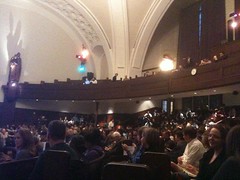 Let me describe the vibe of the room – it was buzzing and once again it reminded me of that line “Rob Bell is a rock star in the evangelical world”. Don’t take it out on Bell, it was similar to that when we went see NT Wright at Wheaton too and that crowd was a bit older, established, educated even, etc. Indeed the room was filled with many appreciators of Rob. I wondered beforehand how many critics were there given the firestorm but even during the Q&A, I didn’t get the sense that many had come. I thought all the questions were honest (though they may not have been great) but certainly appropriate for what everyday people are thinking like, “Will God force an atheist into heaven?” And for those wondering, the questions were selected randomly.
Let me describe the vibe of the room – it was buzzing and once again it reminded me of that line “Rob Bell is a rock star in the evangelical world”. Don’t take it out on Bell, it was similar to that when we went see NT Wright at Wheaton too and that crowd was a bit older, established, educated even, etc. Indeed the room was filled with many appreciators of Rob. I wondered beforehand how many critics were there given the firestorm but even during the Q&A, I didn’t get the sense that many had come. I thought all the questions were honest (though they may not have been great) but certainly appropriate for what everyday people are thinking like, “Will God force an atheist into heaven?” And for those wondering, the questions were selected randomly.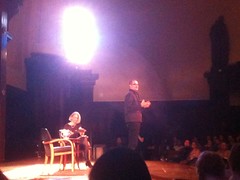 Soon after he was asked another direct question (around the 28 minute mark) that was something to the effect of “Coming from a Jewish family, we would find it offensive for you to imply that our salvation has to come from Jesus.” I seriously wonder if anyone in evangelicalism could have had a better a Christian answer and not come across as offensive to her. It was probably my favorite moment of the night. He refereed to Moses striking the rock and providing water for the Israelites (Numbers 20) and said later, Paul describes the water from this rock as Christ (I Cor. 10). Paul does not offer much commentary there but the implication is that God has always been rescuing people. He mentions that it’s good for us to be generous when talking about such things, Jesus comes and makes the Torah speak, shows compassion, love, etc. concluding that Jesus is a paradox that we have been wrestling with for thousands of years. She seemed sincerely satisfied with that answer and frankly, I am not sure many other evangelicals could have done better in the sense of serving the asker and honoring the Lord. Some may dismiss that as tightrope walking, others may see it as a powerful and truthful moment.
Soon after he was asked another direct question (around the 28 minute mark) that was something to the effect of “Coming from a Jewish family, we would find it offensive for you to imply that our salvation has to come from Jesus.” I seriously wonder if anyone in evangelicalism could have had a better a Christian answer and not come across as offensive to her. It was probably my favorite moment of the night. He refereed to Moses striking the rock and providing water for the Israelites (Numbers 20) and said later, Paul describes the water from this rock as Christ (I Cor. 10). Paul does not offer much commentary there but the implication is that God has always been rescuing people. He mentions that it’s good for us to be generous when talking about such things, Jesus comes and makes the Torah speak, shows compassion, love, etc. concluding that Jesus is a paradox that we have been wrestling with for thousands of years. She seemed sincerely satisfied with that answer and frankly, I am not sure many other evangelicals could have done better in the sense of serving the asker and honoring the Lord. Some may dismiss that as tightrope walking, others may see it as a powerful and truthful moment. network for Christians, concerned citizens, churches and ministries around the world. Collyde is a non-profit organization that is committed to channeling 100% of net profits directly to fight social and economic causes around the world”.
network for Christians, concerned citizens, churches and ministries around the world. Collyde is a non-profit organization that is committed to channeling 100% of net profits directly to fight social and economic causes around the world”. As mentioned, I enjoyed the panel discussion with
As mentioned, I enjoyed the panel discussion with 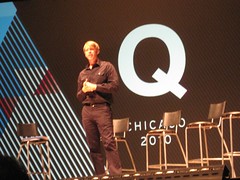 Who Attends Q?
Who Attends Q?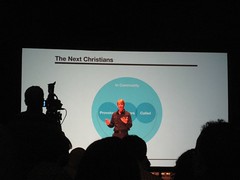 The Next Christians – Gabe Lyons
The Next Christians – Gabe Lyons “We need a new standard of teachers that are better.”
“We need a new standard of teachers that are better.”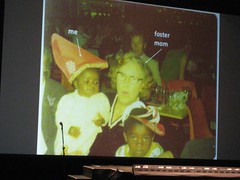 She then put a picture of her, her sister and her foster mother and asked, “Would you have found me in the rubble?” Because she was lost and buried in it and needed a great deal of help. It was a brilliant turn in the presentation – instead of presenting as the hero, she presented as the rescued, who in turn committed to rescue others. I was moved, she was brilliant.
She then put a picture of her, her sister and her foster mother and asked, “Would you have found me in the rubble?” Because she was lost and buried in it and needed a great deal of help. It was a brilliant turn in the presentation – instead of presenting as the hero, she presented as the rescued, who in turn committed to rescue others. I was moved, she was brilliant. When all words mean the same thing, no words mean anything?
When all words mean the same thing, no words mean anything?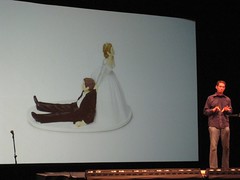 1. men want sex more than women
1. men want sex more than women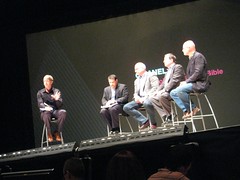 That evening, there was a panel discussion on Scripture with Alister McGrath, Brian McLaren, Father Dempsey Rosales-Acosta and Tim Keller. It is heavy in context so to debrief in this space would be inadequate but I will say it was an excellent discussion. There were parts that I was not able to connect with and parts that I cheered (sometimes said by the same person). I look forward in listening to this conversation again.
That evening, there was a panel discussion on Scripture with Alister McGrath, Brian McLaren, Father Dempsey Rosales-Acosta and Tim Keller. It is heavy in context so to debrief in this space would be inadequate but I will say it was an excellent discussion. There were parts that I was not able to connect with and parts that I cheered (sometimes said by the same person). I look forward in listening to this conversation again.




Recent Comments